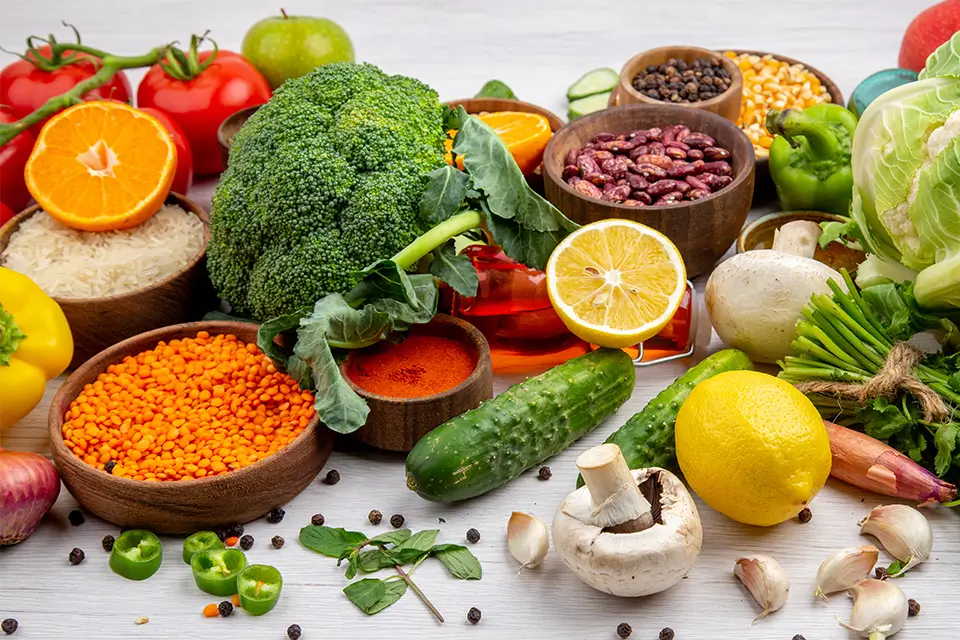Achieving and maintaining optimal health relies significantly on what we eat and drink. With modern lifestyles often marked by time constraints, stress, and the convenience of fast foods, making the right dietary choices can be challenging. However, a well-thought-out diet filled with nutrient-dense whole foods can be the foundation of vibrant health and longevity. Here’s a guide to crafting a diet that nourishes the body and supports overall well-being.
Limit Ultra-Processed Foods
Numerous studies have linked ultra-processed foods to a higher risk of chronic diseases, such as diabetes, heart disease, and even early death. Foods like soda, candy, fried snacks, and highly processed meats may taste appealing, but their high sugar, salt, and unhealthy fat content can compromise your health.
While you don’t need to eliminate these items entirely, it’s wise to limit them. Reserve these treats for special occasions, and instead focus on consuming whole, unprocessed foods. For example:
- Vegetables and Fruits: These should form the cornerstone of your meals, offering vitamins, minerals, and antioxidants.
- Lean Proteins: Fish, chicken, eggs, and plant-based options like tofu provide essential amino acids.
- Healthy Fats: Incorporate avocados, nuts, seeds, and olive oil into your diet.
- Whole Grains: Brown rice, quinoa, and oats are excellent sources of fiber and complex carbohydrates.
Hydration: The Foundation of Wellness
Staying hydrated is essential for overall health, yet it is often overlooked. Water is the best option for hydration, as it supports bodily functions without adding empty calories. Here are some tips for smart hydration:
- Drink Plenty of Water: Aim for at least 8–10 cups daily, more if you’re physically active or in a hot climate.
- Flavor Your Water Naturally: Add a squeeze of lemon or slices of cucumber for a refreshing twist.
- Avoid Sugary Drinks: Replace soda, energy drinks, and sugary coffee beverages with herbal teas or infused water.
Create Balanced Meals
Eating balanced meals can be simplified by focusing on three main components:
- Protein: Include options such as chicken, fish, eggs, or plant-based proteins like beans and lentils.
- Healthy Fats: Use olive oil for cooking or add nuts, seeds, or avocados to your meals.
- Fiber-Rich Carbohydrates: Opt for whole grains, starchy vegetables, and low-carb fiber sources like broccoli or berries.
For instance, breakfast could be scrambled eggs with spinach, avocado, and a side of berries. Lunch might feature a sweet potato stuffed with black beans and veggies, and dinner could be baked salmon with roasted asparagus and quinoa.
Planning Ahead: Grocery Shopping and Meal Prep
One of the best ways to ensure healthy eating is to plan ahead. By stocking your kitchen with nutritious ingredients, you make it easier to prepare wholesome meals at home. Include the following items on your shopping list:
- Fresh and frozen fruits and vegetables
- Protein sources such as chicken, tofu, or canned fish
- Whole grains like brown rice and quinoa
- Healthy fats such as nuts, seeds, and olive oil
If you’re short on time, focus on simple meal prep. Start with a single meal, such as breakfast or dinner, and gradually incorporate other meals into your routine.
Develop a Healthy Relationship with Food
A positive relationship with food is just as important as the food itself. Disordered eating patterns and fad diets can lead to physical and mental health challenges. Avoid labeling foods as “good” or “bad,” and instead, focus on balance and moderation. If needed, consult a registered dietitian or psychologist to develop sustainable eating habits.
Tips for Healthy Eating in the Real World
Making healthy choices amidst a busy lifestyle is possible with a few practical strategies:
- Prioritize Plant-Based Foods: Include fruits, vegetables, nuts, and beans in every meal.
- Cook at Home: Home-cooked meals are generally healthier and more nutrient-dense than takeout.
- Be Realistic: Progress, not perfection, is the goal. Start with small changes, like cooking one meal at home each week.
- Avoid “Cheat Days”: Viewing food as something to “cheat” on can create a negative mindset. All foods can fit into a healthy diet when consumed in moderation.
- Choose Filling Foods: Opt for meals rich in protein and fiber, which keep you full longer.
Food and Mental Health: The Gut-Brain Connection
Emerging research suggests a strong connection between diet and mental health. The gut, often referred to as the “second brain,” houses trillions of bacteria that influence mood and cognitive function. To support gut health:
- Eat Probiotic-Rich Foods: Include yogurt, kefir, and fermented vegetables like kimchi.
- Increase Fiber Intake: Fiber feeds beneficial gut bacteria, promoting a healthy microbiome.
- Limit Artificial Sweeteners: Some studies suggest that artificial sweeteners may negatively impact gut health.
Superfoods to Include in Your Diet
Certain foods are nutrient powerhouses, offering exceptional health benefits. Consider adding these superfoods to your meals:
- Berries: Packed with antioxidants that combat inflammation.
- Leafy Greens: Spinach, kale, and arugula are excellent sources of vitamins and minerals.
- Nuts and Seeds: Rich in healthy fats, protein, and fiber.
- Fatty Fish: Salmon and mackerel provide omega-3 fatty acids essential for heart and brain health.
- Legumes: Lentils and chickpeas are versatile and high in protein and fiber.
The Importance of Moderation and Variety
No single food can provide all the nutrients your body needs. A diverse diet ensures you receive a broad spectrum of vitamins, minerals, and other beneficial compounds. Moderation is equally important, allowing you to enjoy occasional indulgences without guilt.
Making Sustainable Changes
Adopting a healthier diet is a journey, not a sprint. Here’s how to make changes that last:
- Set Achievable Goals: Start small, such as drinking more water or eating one additional serving of vegetables daily.
- Stay Flexible: Life happens, and it’s okay to stray from your diet plan occasionally.
- Celebrate Progress: Acknowledge your efforts and improvements, no matter how minor.
Conclusion
Eating and drinking for optimal health is about creating a sustainable, enjoyable lifestyle. By focusing on whole, nutrient-dense foods, staying hydrated, and fostering a positive relationship with food, you can support your physical and mental well-being. Small, consistent changes can lead to significant health benefits, empowering you to thrive at every stage of life.



